Victoria Dougherty's Blog, page 7
October 29, 2021
Transformation, Transcendence, and Realization: The Spirit of Halloween Has a Greater Impact Than We Might Think
In just a scant few days, the lot of us will be dressing decidedly unlike ourselves: as ghosts, vampires, mythological figures, and cultural icons. We might watch a scaaaary movie – the kind with a soulless, masked fiend who won’t give up until he’s plunged an axe into some teenager’s head. Or a sentimental one like “It’s the Great Pumpkin, Charlie Brown,” if we’re not the blood, guts, and night-terrors types. The children in our lives will undoubtedly beg us to take them to one of those haunted houses or corn mazes that pop up around this time of year – and we’ll pretend to be above all the jump scares. At the very least, we’ll settle in, and enjoy some crisp, fall weather, complete with a bit of moon, some howling wind, and fistfuls of candy.
As you may have inferred already, Halloween holds a special place in my heart. It’s spiritual, whimsical, a little naughty, romantic, commemoratory, and creative; a loaded hot fudge sundae of all the things I love. Plus, its aesthetic pretty much lasts for a whole season. I know at our house, we start to set the pumpkins on our porch around end of September, and add some spooky elements to the yard no later than October 1. Those might come down a few days into November, but the pumpkins stay put until December 1, for sure.
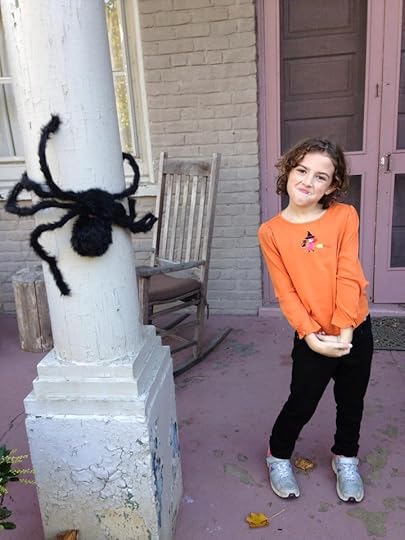 That’s not a real spider
That’s not a real spiderBut there are some elements of Halloween that have historically continued all year long at Chez Dougherty. Namely, the costumes and make-up part.
Transformation has always been a theme in our family, a phenomenon that has long outlasted those halcyon days when our children were little – the “I want to wear a princess outfit every day” and “Why can’t I go to school wearing a hat and have a whip tucked into my belt?” years, when our brood looked like some insane mash-up of a Renaissance fair and The Village People.
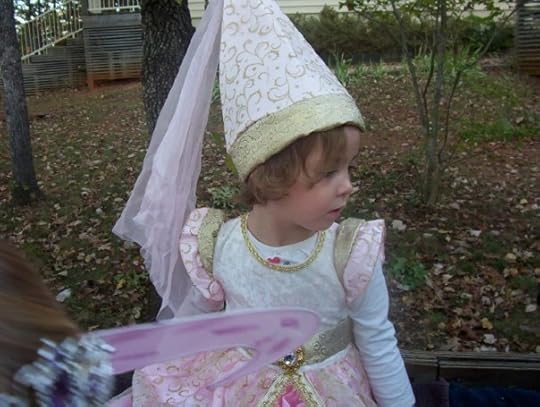 She wore this outfit every day for almost a year
She wore this outfit every day for almost a year
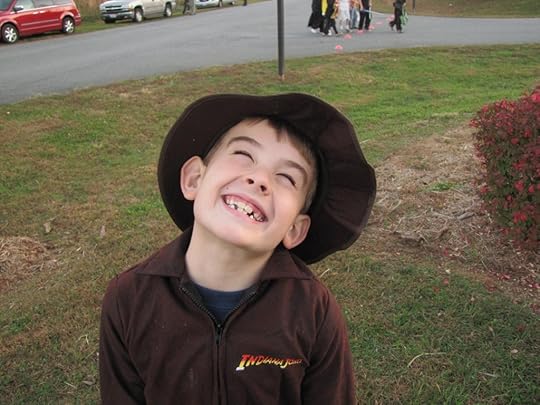 Ditto with the Indiana Jones get-up
Ditto with the Indiana Jones get-upFor the most part, we took for granted our children’s propensity to indulge in comically preposterous versions of themselves, even when to outside eyes they were beginning to look a little old for all of this dress-up business. With a snicker and a shrug, we fed them a steady diet of the accoutrements they felt were essential to their persistent quest for transformation: the special fx make-up kits, the wig collections, the colored contact lenses (in red, white, black, spiral – yes there is such a thing as spiral and it’s creepy as hell), the “man of the wilderness” accessories (going well beyond clothes and camping equipment, to include axes, fire-starters, bows and arrows, and other stuff I’m not willing to put in print), the vintage military uniforms, the second-hand clothing stores and online boutiques dedicated to ancient couture. The wild, wacky, beautiful, frightening, hideous, overtly feminine, and unapologetically masculine all merged and disjoined kaleidoscopically at our house.
Yet it’s only recently that my husband and I have fully come to realize what a big part of our family life involved this kind of play, and the effect it’s had on how our kids perceive themselves, and have grown into their own.
It was just last week, as a matter of fact, that I had a revelation as I started putting together a few photos of Halloweens past. It’s the first year that we’ll have no active trick-or-treaters in our house, and I wanted to take a little trip down memory lane. And while I knew that my kids had always been great at creating smart and hilarious Halloween costumes, and that they could be, shall we say, sartorially eccentric at times, I was struck by just how many costume and make-up shots we’d collected over the years. Ones that had nothing to do with Halloween at all, and were snapped pretty much on any old Tuesday.
As I arranged the pictures in chronological order, I started to see patterns emerge. Elements of style that our kids had built all on their own, on their terms; ones that were reflective not of poses meant to obscure who they were on the inside, but rather, bring it out.
Ensemble after ensemble enabled our children to see themselves in the best possible light…
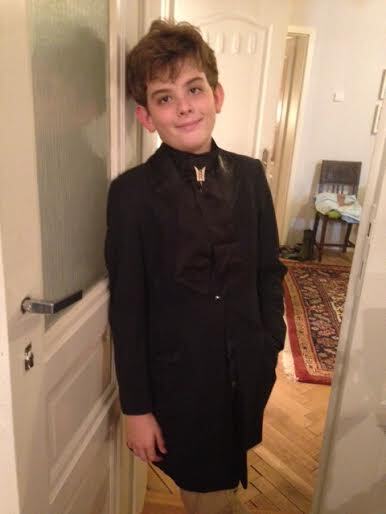 Our son in vintage coat and tails during our trip to Prague.
Our son in vintage coat and tails during our trip to Prague. Or invited them to delve into their darkest fears…
 Beaten-up make-up perfected at theater camp
Beaten-up make-up perfected at theater campI was moved by how psychological many of these imaginings were, aiming to mess with perceptions, and uncover hidden emotions. The way they revealed longings, conflicts, and ways in which our children may have felt misunderstood.
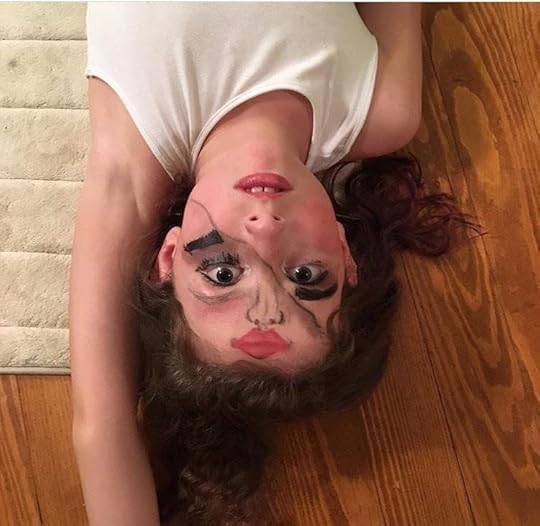 Josie two-face
Josie two-faceAt times, I recognized them crying out to be seen as how they hoped to be, or would be, if allowed to exhibit their true selves; young men or women capable of heroism and daring-do, even when it went against the grain of what their friends were dreaming for their own lives.
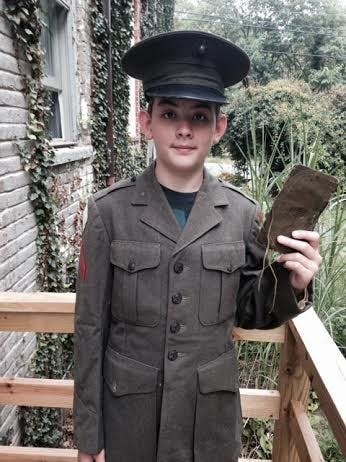 Our son at 12, wearing his grandfather’s World War II Marine Corps uniform
Our son at 12, wearing his grandfather’s World War II Marine Corps uniformTheir costuming played with class, sex appeal, moral and ethical dilemmas, as they explored character traits and careers, trying on aspects of their personalities that might trend towards the dangerous, the alluring, the disruptive.
 blonde bombshells
blonde bombshellsBut what hit me hardest, took my breath away, was how over time, they each developed their own singularities, picking and choosing from years of envisaging and creating, until they found what fit. What helped them stand apart in a crowd, or just hold their own in our boisterous family. What made them fit in, too, becoming a unique puzzle piece in a larger picture filled with peers, friends, cousins, sisters, and brothers.
How fantasy became reality.
The man of adventure and wilderness, the smart sophisticate, the artist lost in her thoughts and her world, now stand in relief next to the older photographs of their burgeoning selves. I can see the pieces were there all along, and were, perhaps, inevitable from the start.
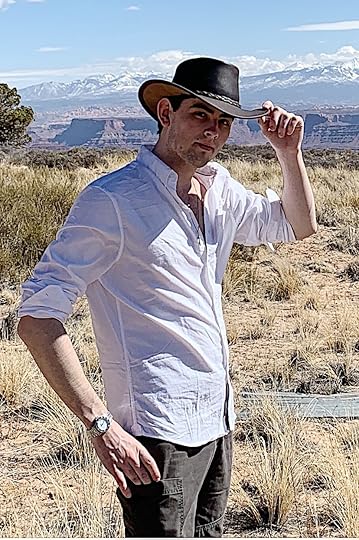
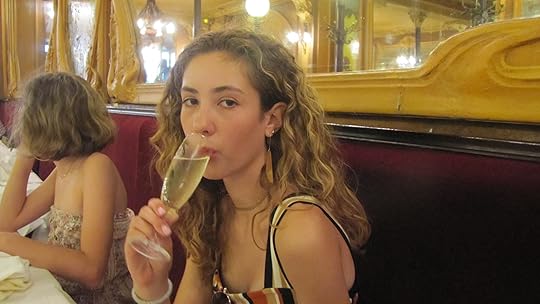
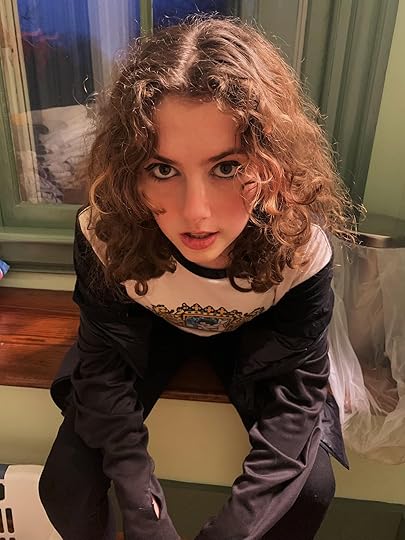
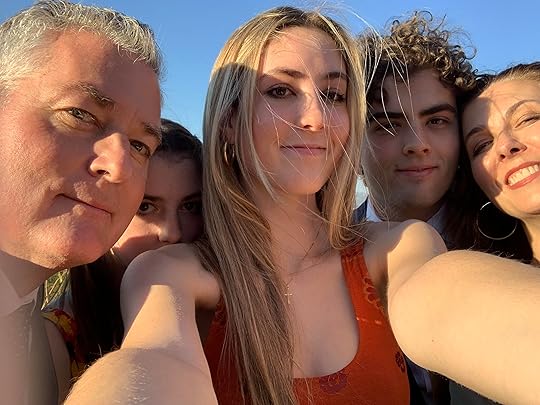
October 7, 2021
The Bones of a Social Media Feud
An interesting thing happened to me on Twitter this week.
I found myself at the center of a minor literary feud between two major media and literary figures. It was a tweet I posted that started it all – really had very little to do with me as a person or an author. A measley tweet about Halloween decorations, of all things.
I should point out that I have but a small Twitter following – a smidge over 6000 souls, who are largely interested in writing, weird pictures, Cold War antics, and passionate kisses. I’m hardly a lightning rod for contraversy. And my influence on that platform is something akin to an actor who has a walk-on role in a giant blockbuster film. You know, the guy who comes up to Brad Pitt and says, “Excuse me, sir. You dropped your hat,” and then walks off, never to be seen or heard from again.
I should also stress that when I say “minor literary feud,” I mean just that. A veritable teardrop in a big, ice-cold resevoir. But I digress.
What’s strange is that my tweet was really innocuous. Just a photo I snapped of a big, black Victorian house in San Francisco – one that had been cleverly decorated for a certain children’s holiday that’s coming up at the end of the month. My family was in California for a wedding, and my daughters and I were just strolling the neighborhoods, and getting in the spooky spirit of things, documenting the funky, funny, gorgeous, and ridiculous. Anyway, here’s the tweet, so you can see for yourself:

To my surprise, this run-o-the-mill tweet went viral, attracting thousands of “likes” and “retweets” over a couple of days. Stranger still, two women I admire – feminist author and scholar Christina Hoff Sommers and literary queen Joyce Carol Oates, no less, got into a minor skirmish about this simple little photo and comment about Halloween decor.
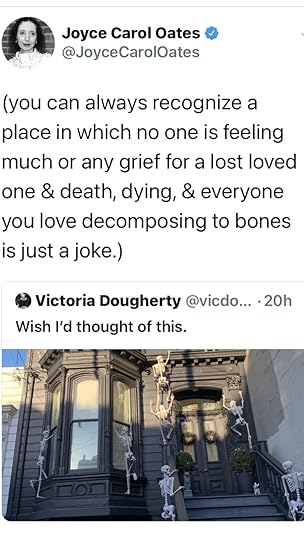
To which Christina Sommers replied:
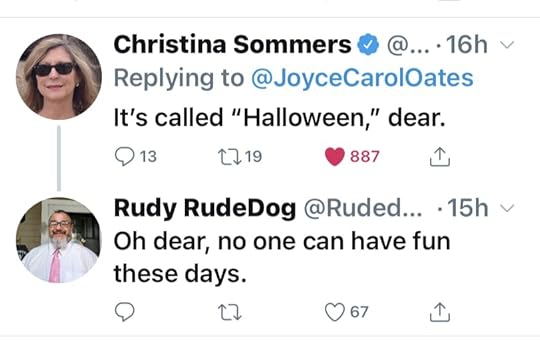
And
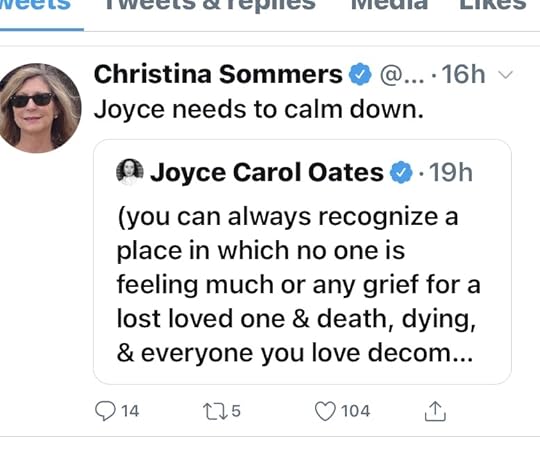
I do wish the tweet at the center of all of this had more substance to it than – wow, check out these cool Halloween decorations. I mean, this hardly spawned a Keats vs Byron, Hemingway vs Faulkner, le Carre vs Rushdie kind of fracas. It wasn’t even a good row over professional jealousy like the feuds between Gore Vidal and (insert just about any literary figure who was his contemporary).
But, it is a sign of the times.
An era when we’re just on each other’s nerves and constantly picking each other apart. Especially on social media. At our best, we make connections, even friends on these platforms, and learn in quick-time about history, science, politics, and cultural phenomenons. At our worst, we try to destroy the lives and livelihoods of strangers over misunderstandings, semantics, or wrongthink.
Don’t worry – this is not going to be one of those anti-social media diatribes. As far as I’m concerned, these platforms are here to stay, and we simply have to learn to live with them, the way we adapated to the telephone, automobile, radio, and television. These were once hugely contraversial, too, and many thought they would mark the end of civilization, sending us into a downward spiral from which we would never recover. Even the mirror, when it became a common, household item, was viewed as an evil invention that would ultimately destroy us – drowning us the way Narcissus was drowned, falling into a pond while staring at his own reflection.
But unlike Narcissus, we learned to swim.
It’s true that we’ve probably spent too much time staring at ourselves since first getting a gander at our accurate reflections. But the mirror also helped us see ourselves anew. It allowed us to (pardon the pun) reflect deeply upon beauty and its inverse, and was for a long time regarded as a portal to the supernatural, inspiring art, literature and countless spiritual odysseys.
What does this all have to do with a spat about Halloween decorations? Oh, hell, who knows? Maybe I’m just trying to say that in the end everything is going to be alright.
September 24, 2021
Cold Goes Wide and Into the Unknown!
I want to address all of you Cold readers who have been asking when my ebooks will be available wide and no longer be exclusive to Amazon.
The answer is…now!
As of this week, The Bone Church, The Hungarian, and Breath will all be available at Apple, Barnes & Noble, Kobo, and all of your preferred booksellers. They will still be available on Amazon, of course. Savage Island and Welcome to the Hotel Yalta will continue to be available wide, as they’ve never been exclusive to mighty Amazon.
Here’s where you can get ’em!
In a time of danger and distrust, two lovers seek redemption…and a way back to each other. “The Bone Church” is a hypnotic tale of war and passion!
The Bone Church in a whole bunch of stores.
The Bone Church in the Kobo store.
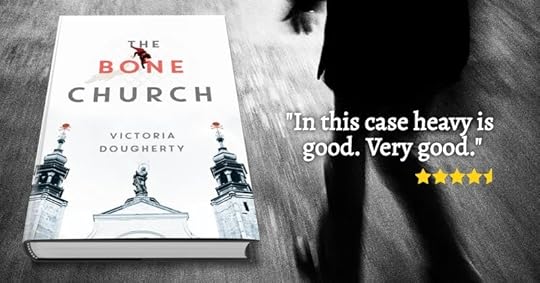 caption for image
caption for image“The Hungarian” is a stylish and sexy thriller that readers have called the literary love child of John le Carré and Quentin Tarantino!
The Hungarian in a whole bunch of stores.
The Hungarian in the Kobo store.
 caption for image
caption for imagePassion. History. Immortality. From the author of “The Bone Church,” comes a stunning new series about a girl, a boy, and the price of eternal love.
Breath in a whole bunch of stores.
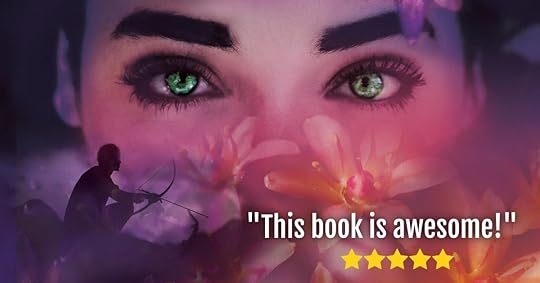 caption for imageBut Wait…There’s More
caption for imageBut Wait…There’s MoreI am both elated and relieved that I’ve finally finished “Of Sand and Bone,” Book 2 of the “Breath” series. I’m combing through the manuscript for the usual continuity problems, spelling errors, and grammar faux pas, then sending it off to my editor on October 1.
Here’s a snippet:
Cairo, Egypt, 1886
“I must have woken up screaming again. I’ve been doing that every night since I was born. Three weeks ago yesterday. Usually when I dream – especially so soon after a birth – I’m bathed with memories from my previous lives. I’m visited by my forever love, Nif, and we whisper to one another about how we can set about finding each other in this life. Perhaps discover a way we can leave clues that point us in the right direction. It is soon after a birth that dreams are all we have left. Our waking hours become consumed by our new lives and our memories of the past dissolve like sugar in tea.
Such is the life of a Nin’ti. And that’s what I am, what Nif is.
We’re as rare as angels or demons.
Born to live and die over and over again. Born to love only the other. Born to help God’s human experiment endure.
Only this time around, things seem a bit different. I fear my dreams are firmly anchored in the present time and I’m watching what is, not what was. Nif’s voice has come to me only once or twice since I took my first breath, and I wonder if he isn’t absorbed by what I see, too.
“What I see in my dreams is death. Death in the desert,” I tell him.
“Then we must go there,” he finally says.
“There is a wind that speaks of anger in the desert. It will make you bow so low that you will no longer be.” I sing to myself, to Nif, from the Songs of the Desert Wind.
It’s an ancient, epic song that could be sung for days without end. My father used to sing it to my mother, but only the more pleasant parts. The beautiful ones made of poetry. My first father to my first mother, I mean. They died long before the great kings of Europe and the Orient. Before Caesar. Before Moses.
“Leila,” my new mother says. Her voice as cool and rich as fog.
I let go of her nipple and look up into her face. I love her eyes, black and wet like a London street after a heavy rain. I love her, so kind and strong. I wish I could speak to her, tell her what I see in my dreams before my memories up and leave me. I know she’d believe me; that she’d understand. Not all mothers would, but Llizabith Saber is different. Her rebellious heart, her Egyptian blood, her lyrical brain. She understands the truth of myths and fiction, knows the science in them. I could tell her what I saw in the desert through my dreams. Something I hoped I would never see again. I could warn her. Warn them all before I forget.” -Of Sand and Bone by Victoria Dougherty

September 10, 2021
Back in the Cold!

For the last few years, I’ve been in the desert. A hot, dry, gorgeously infinite no man’s land filled with war and warriors, love and lovers, mysteries and mystics. At least as far as my fiction is concerned. My new “Breath“ series, a historical epic with some major fantasy and romantic elements, takes place in some pretty scorching places, including the Sahara desert of the ancient past, and Cairo of the complicated, glittering present. There are even a few steamy and mucky Virginia summers thrown in there.
But you can’t keep a girl out of the Cold for too long. At least not this girl.
Now that I’m fixing to hand over “Of Sand and Bone” (Book 2 of the “Breath” series) to my editor, lighting a fire to the process of getting it ready for public consumption, I’m turning my attention back to the Cold War.
It’s high time I finish Book 3 of The Cold War Chronicles, which has been on my back burner for far too long. “Tower of Silence” will follow its predecessors “The Bone Church” and “The Hungarian,” and concern characters from both of these earlier novels. Rest assured, this story will come out swinging! With a slew of grisly murders, a cruel and cultish villainess, and a cryptic series of coded messages, “Tower of Silence” promises to be a Cold War thriller you can sink your teeth into.
Did I mention that it takes place largely in 1950s India?
 This is 1950s Bombay
This is 1950s BombayAnd just to psych myself up for a return to my beloved thriller genre, I’m debuting “The Bone Church” and “The Hungarian” in beautiful hardcover on Amazon!
The Bone Church in hard cover right here

The Hungarian in hard cover right here!
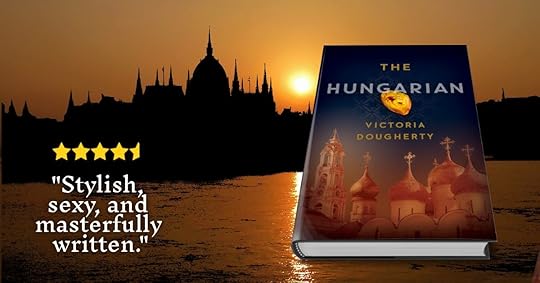
For those of you who have been waiting for my novels to be available in stores other than Amazon, your wish is my command. Within a fortnight, “The Bone Church,” “The Hungarian,” and “Breath” will be joining “Welcome to the Hotel Yalta,” and “Savage Island,” in stocking the virtual shelves at Apple, Barnes & Noble, Kobo, and all the usual suspects. I promise to keep you updated as I branch out from Amazon, and take my books out of Kindle Unlimited for the time being, and make them available to a wider, non-Amazon exclusive readership. I’m really excited about this, and look forward to reaching new storylovers, and working with a variety of partners to get my fiction out there!
Speaking of getting things out there, I’ve got a brand-spanking-new Love at First Write up on my YouTube channel! It’s a juicy one on the changing perception of love throughout literary history – basically from Homer to Fifty Shades of Grey! Please don’t forget to like and subscribe 
Stay Cold, my friends!
August 27, 2021
I Can’t Believe It Actually Happened
Something big happened this week. A monumental thing that I was beginning to think would never actually come to be.
My children went back to school. I mean in-person, out-of-my-hair and out-of-my-house school.
Yet I find myself conflicted.
We’ve gotten used to each other’s rhythms over the past roughly year and a half, and have enjoyed large swathes of our time at home and together.
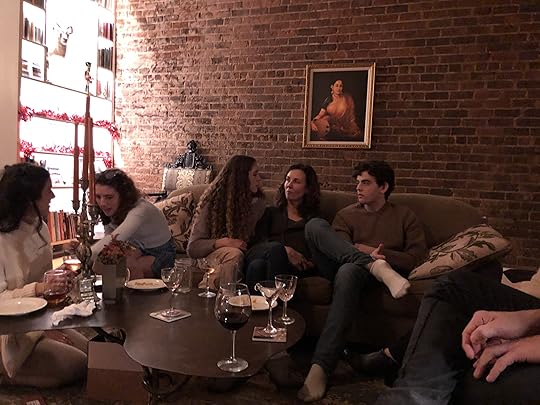 They would otherwise be out on the town, with friends.
They would otherwise be out on the town, with friends.We’ve sunbathed on our porch, gone for bike rides, hung out on our hammock, and eaten well – I even tried to give them Czech lessons. I learned that I probably could successfully home school them if I had to – although, yes, it would make it harder for me to get what I consider an adequate amount of work done. But still, it would be possible and not entirely unpleasant. I’m a pretty good teacher, after all – at least according to my students from way back in my teaching days. And my children are damned good pupils, if I do say so myself. Curious, skeptical, funny, hungry for experience, and willing to take chances.
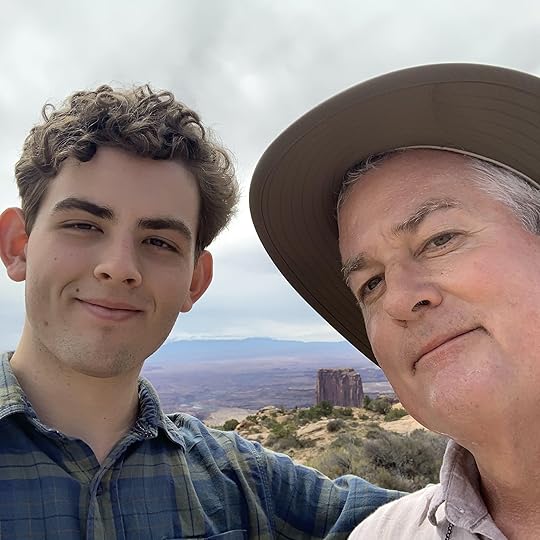 My husband and son on a camping trip in Moab last summer
My husband and son on a camping trip in Moab last summerUltimately, however, the social aspect of going to school is something we all value almost as much as the instruction. And being writers, both my husband and I need some solitude – time away from everyone, even our beloved kids and each other – in order to do our best work, our most thorough and creative thinking.
But I won’t lie. I miss them.
As happy as I was to see them driving away Monday morning – off to meet up with friends at a local cafe for some first-day-of-school coffees – I knew this unexpected, uncomfortable, yet undeniably close Covid-era togetherness was coming to an end. While I’m not anxious for the return of lockdowns, and I hope for the sake of our collective health (both mental and physical), that the Delta variant disappears as quickly as it’s flared up, I’ve not-so-secretly enoyed the fact that my kids have been forced, for the collective good, to be homebodies.
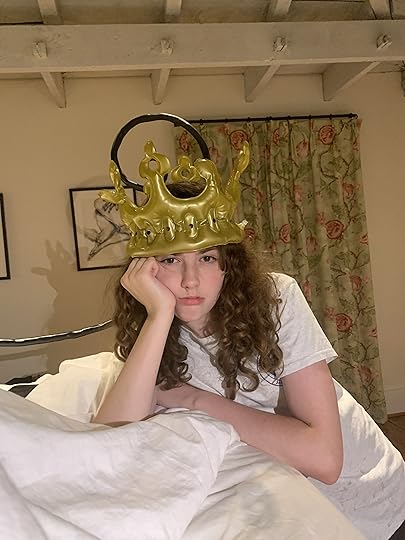
Even if I do think friend groups, neighborhood haunts, breaking the rules, and otherwise spreading their wings and sowing their wild oats (within reason) are crucial aspects of development, and would never deny them any of these on purpose.

Nor would I ever deny that Covid has cost our family and our community a lot. I lost my father to Covid. While I was raised by my mother’s second husband, a man I called “Dad,” my biological father was a huge part of my life, my story. A deeply quirky and eccentric man, he was the source material of countless, often hilarious anecdotes.
About his almost pathological obsession with the outdoors (at the ripe old age of eighty, he was still camping for a full half of the year).
And how he would play passionate concertos on our piano – beautifully – only he’d do it at 2:00 a.m., and seem genuinely perplexed when I would come downstairs and ask him to give it a rest. That the kids had school the next day!
Or that he was in love with my mother until the very end, despite the fact that they’d been divorced for over fifty years.
My father was terrified of COVID, yet single and lonely. His need for company is what would kill him, when he broke down one night and went to a local drinking hole – just for some company. Some thirty people would become infected with the virus at that bar, and he would be one of them.
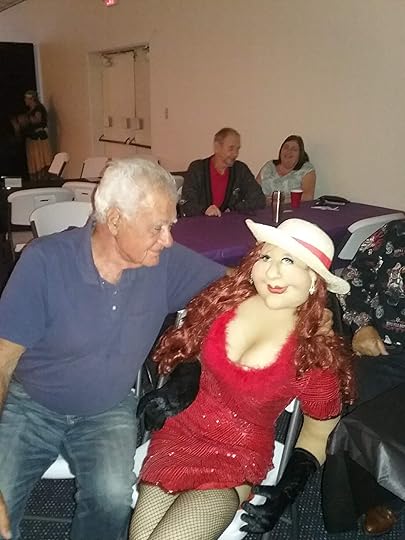 My father, with a date.
My father, with a date.We lost friends to depression. Two people we care about deeply took their own lives. Smart, funny, loving people, who had been fully engaged in life! I believe the Covid lockdowns played no small part in their feelings of despair.
And we know people whose businesses closed, or just barely hung on.
Still, I’m aware of how lucky I am. To have not gotten sick, or gone broke, or lost my mind. Most of all, to have been given the opportunity to spend quality and quantity time with the people I love most.
Looking back, I think that’s all I’ll remember. That, and my husband’s fabulous, nightly cocktial conctions.
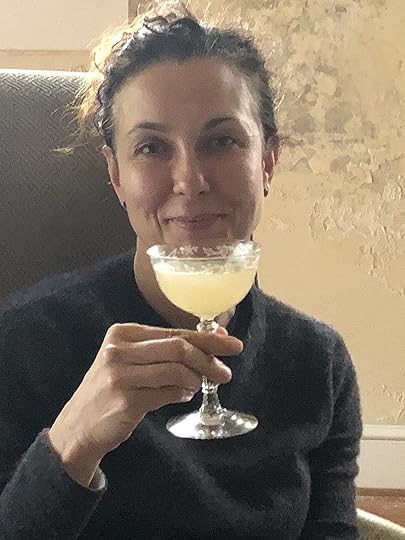 caption for image __ATA.cmd.push(function() { __ATA.initDynamicSlot({ id: 'atatags-26942-61289c8f081ee', location: 120, formFactor: '001', label: { text: 'Advertisements', }, creative: { reportAd: { text: 'Report this ad', }, privacySettings: { text: 'Privacy', } } }); });
caption for image __ATA.cmd.push(function() { __ATA.initDynamicSlot({ id: 'atatags-26942-61289c8f081ee', location: 120, formFactor: '001', label: { text: 'Advertisements', }, creative: { reportAd: { text: 'Report this ad', }, privacySettings: { text: 'Privacy', } } }); });
July 29, 2021
A Picture Becomes a Thousand Words
“There’s a theme to the art you have hung up in your office: black and white creepy pictures.” –My daughter
I think she’s exaggerating. The pictures in my office aren’t exactly creepy. They definitely have a mood, perhaps a bit of a noir sensibility mixed in with some historical context; a little woo-woo occult flavor thrown in here and there. Only one of them crosses the line into classic Twilight Zone territory, though. That one’s of The Tower of Silence in Mumbai and relates directly to a novel I’m in the process of writing.
The Tower of Silence is essentially an open air burial ground for an ancient, pre-Islamic religious sect called Zoroastrianism, and yes, that’s right, those are vultures perched on the tower’s wall. But isn’t it wonderful? There’s a sense of peace to the photo, and it reflects – at least to me – a natural order.
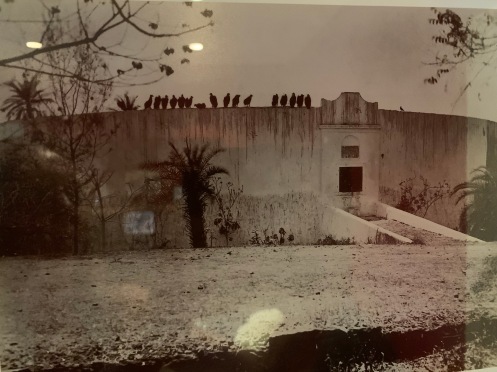
And here’s one of the Jewish Cemetery in Prague’s Josefov Quarter. It’s got thousands of gravestones, all of them sticking up this way and that like crooked teeth. Bodies deep in the ground buried one on top of the other. I love the history, the religiosity, and resilience of such a place, and feel comforted by its existence. This photo, by my friend Susan, sits just to the left of my desk, and I like to take it in when I’m writing a particularly ethereal scene.
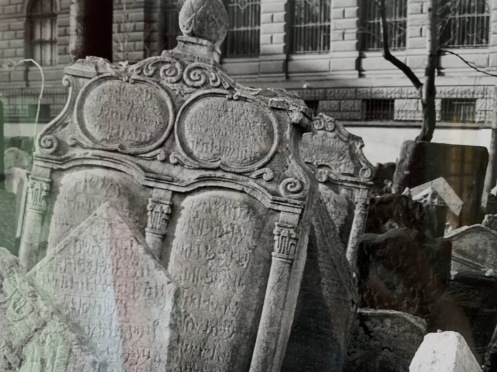
This next shot is an aerial view of Peace Square in Prague. One dominated by perhaps my favorite neo-Gothic cathedral, the Cathedral of St. Ludmila, named after the saint and martyr who also happened to be the grandmother of Good King Wenceslaus. It is said she was strangled with her veil at the behest of her own daughter-in-law, who opposed Ludmila’s attempts to convert the Slavs to Christianity.
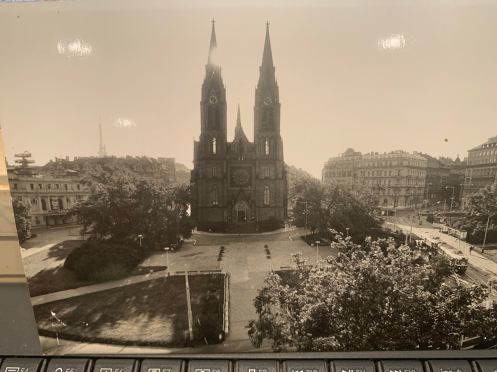
Well, alright, maybe my daughter has a point. Except here’s another one. It’s not an actual print. I tore it from a picture book and intend to have it framed, as a sort of poor man’s short cut to a collection of real art photography. It’s a Jan Saudek, and reminds me of my son, who used to get so excited when the coal trains passed by our house. One time, when he was barely four years-old, a conductor let him sit in the cab and blast the horn.
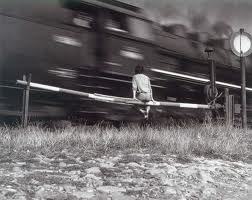
I like old pictures. I have for as long as I can remember. They seem to mix in with my own life’s narrative quite seemlessly, the way cognac dissolves into a complex, creamy sauce tailor-made for a beef tenderloin.
Old pictures are contemplative, capturing stillness in a way that the quick and brilliant modern lens does not. Or doesn’t seem to. Perhaps it’s modern life that refuses to be caught standing still?
And old pictures are a bit like a prayer. They make us think, reflect, rather than merely react. We might end up whispering to ourselves as we ponder the unsuspecting characters we observe in those images, and the historical events we know await them. “Good, God, just five years from the time that picture was taken…”
Even the most jovial shots – of an elegant London in the Victorian Era, a wild Berlin in The Golden 1920s, a free and easy California at the apex of the Summer of Love – reek of both nostalgia and danger. Of the years, days, split seconds before influenza epidemics, Titanic sinkings, wars, holocausts, and Manson murders. Of a time before instant global connectedness, when we had little choice but to sit with ourselves, or interact with those around us instead of pretending to be busy, checking our phones.
The spell these pieces of the past have cast upon me are personal, too. They don’t just stem from the active fantasy life of a passionate story-lover, although I admit that is part of it. My interest in bygone eras and foreign lands was triggered by my own childhood perceptions of my family’s country of origin, Czechslovakia. A place that remained shrouded in mystery until I was twenty-one years old.
Due to a rigid communist regime, we couldn’t, under any circumstances visit our one-time homeland – at least not until after 1989, when the Berlin Wall fell – and we had to be very careful about any correspondence with the people we left behind. For their sake, not ours. And my parents had left behind pretty much all of their possessions when they fled, so few actual family photographs made the journey with them to America. Add to that no heirlooms, no trips to visit extended family, not even phone calls.
It was as if we had appeared in America out of nowhere. A family of no ancestors or homeland.

My grandmother’s village
Throughout my childhood, browsing my immediate family history felt a bit like reviewing a redacted government document stamped CONFIDENTIAL. Some of the sentences remained intact, and I got the general gist of what was being communicated, but it was like most of the names and places had been struck through with thick, black marker.
My only comprehensive connection to my parents’ pre-America world came from a stack of old books that were piled up near our stereo cabinet, next to a bunch of polka records. In that pile was one particular book – a big, cloth-covered hard book containing old, black and white pictures of my mother’s birthplace, Prague.
I remember turning each page, utterly disbelieving that this was an actual place, let alone a city my mother knew as well as our southwestern suburb of Chicago. The time-worn, coal stained buildings, the hundreds of spires and gargoyle statues, the rain-slicked cobblestones, and street signs that sported outlandishly tortuous words like Vltavská, and Náměstí Jiřího z Poděbrad, left me agog, contrasting farcically with the split-level Brady Bunch homes, the freshly paved sidewalks, and the friendly, golden arches of McDonalds restaurants that made up my day to day life.
The most ominous were the photos of lonely streets with only a single pedestrian walking. A phantom dressed in old-fashioned formality, utterly unaware of the camera. It was as if she was walking towards me personally, but would keep on walking, never once looking back.
That always gnawed at me.

Prague, which would one day, through a miracle of history, become my home, was presented to me like an old movie set – abandoned, left only for the drive-by tourists, like myself. Not a lot different from the Psycho house that sits on the Universal Studios lot. A place that had been useful once, even famous, but now just sits empty. Gawked at by people who need someone to explain to them who Alfred Hitchcock even was, and why they should care.
“Prague was like Paris until Hitler came,” my grandmother would try to convince me. “Old, yes, but also glamorous and modern. Smart and artistic.”
Studying that old picture book made her assertions seem ludicrous. The buildings appeared dirty and haunted, the people, what people there were, a little sad and a lot distant. It looked like Prague had never seen a party and never would. It was a city that had perhaps known stormy skies and bone-chilling cold, dungeons, funeral attire, and secret societies, but never the kind of revelry that could attract the likes of Hemingway, and other distinguished members of The Lost Generation.
Of course, my moving there, and finally obtaining access to Prague’s past as well as her present, even a glimpse into her future, proved my grandmother right. As always. And showed me just how dramatically a staid narrative could be transformed, reinvigorated, even comletely blown up. Like the very miracle every known religion promises can be delivered by a benevolent God – just when you least expect it.
The Prague of post-communist 1990s, was just that miracle, and a curious place to say the least. Her once gleaming bones – some Gothic, some Baroque, others Art Nouveau and Art Deco – were gorgeous, but every bit as bruised and smudged as the old black and whites of my mom’s picture book. That part was true. Even the people seemed stuck at first, continuing to dress like it was the late 1960s. As if time had stopped when my family left, or more accurately, when the Soviet tanks rolled in, squashing the brief period of political liberalization and protest that had bloomed under a reformist president in that fateful year of 1968. A year that seemed to set the whole world on fire – in a blaze that managed to spread behind the Iron Curtain, despite the perennial wet blanket that had covered those luckless nations since the late 1930s.
Yet, in the Prague of the 90s, there was also a collective breath of relief in the air. A sense of hope and thrill that was unrivaled. A latent boldness had been unleashed, and people were drinking harder, smoking better cigarettes, dancing into the wee hours, and finally, looking forward to the what could be. The past, the present, and the future had converged there, making it the most fascinating place in the world, and all because the unimaginable had happened. The naysayers – politicians, journalists, academics, exiles – had been proven wrong. Dead wrong. A powerful tyranny, thought to be there to stay, had not only crumbled, but evaporated. And practically without a fight.
Out of nowhere, a new world order had been born.

The new “Fred and Ginger” building – designed by Frank Gehry (1992) – near Old Town, Prague.
I suppose it’s that experience – of immersing myself in a series of remote, black and white photos for years, and then stepping into them, witnessing something that had not only been beyond my imagination, but my wildest dreams – that transformed my life. I was shown possibilities I had long since stopped entertaining, and it permanently changed my relationship with promise, anticipation, castles in the air. In other words, faith. This new, imperishable sense of optimism took root and began the process of transforming me from an aimless creative into an author of fiction. It had shaken my American girl shoulders and awakened the Slav in me, too, I suppose, coloring in the black and white photos I’d loved so much, for so long. If that’s not a novel, I don’t know what is.
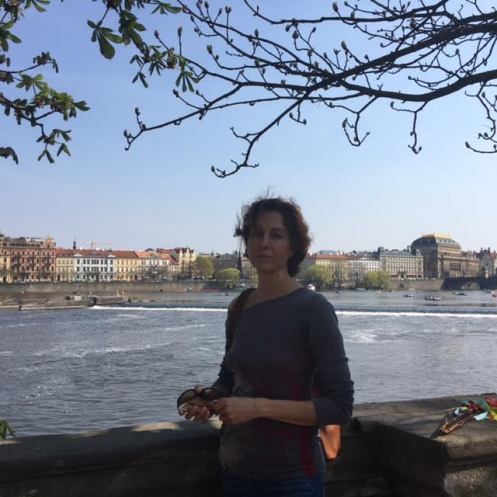
Photographs – particularly ones that inspired me in my youth, or I’ve gone on to “collect” in my adulthood – continue to be rich source material for my work and my spirit. I think they always will be. The places they urge me to visit become part of my make-up. I’ve so often felt like I’ve come home when I’ve stepped into the very scenes I’ve stalked in the old black and white.
I can certainly see how a lover of history, an excavator of the past, could come to believe they have lived before.
Because old pictures, too, have more than one life. They have the life the photographer captured, the many lives envisaged by the people who might gaze at the photo in a book, in an old shoebox, or on the wall of a gallery, and the life we experience when we step into the mud, onto the stone, or the centuries-old mosaic tiles captured on some day years ago, by a single click from a camera.
Those pictures inspire more than a thousand words; they give rise to a thousand worlds.

June 18, 2021
And So We Come to the End
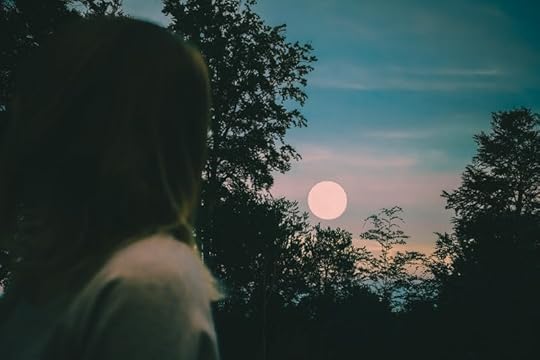
Yes, truly, this is the end of our Cold fairytale-in-progress. Although like many, if not all fairytales, the end can signify a new beginning. That beginning might be assured – with the time-immortal words “And they lived happily ever after,” or it might be more ambiguous. What, we might wonder, happened to Hansel and Gretel after they escaped from the witch, who had planned to eat eat Hansel and keep Gretel as her personal slave? We know they returned home, even though their stepmother had abandoned them in the woods, leaving them at the mercy of hunger, the elements, and nefarious strangers. A famine in their region had made food scarce, and the evil stepmother hoped to convince her husband that his kids had gotten lost, thus leaving more food for her. Now there’s an evil fairytale villain for you!
In the end, Hansel and Gretel awaken in their beds, the morning after returning home, to the sounds of their father and stepmother arguing (no wonder!). So, maybe that’s not so happily ever after. Gretel is also left with the memory of having pushed an old witch into an oven and burning her to death – even if it was for the sake of her brother.
As for Romakaji, you’ll have to decide for yourselves whether you think she and Lionel lived happily ever after or not. I certainly did end the fairytale just as you all (most of you, anyway) wanted me to.
But, this is the Cold, after all. We do like to leave room for interpretation…
“Romakaji” Part 9
By Yours Truly
On the night of the lunar eclipse, the sky was as clear and deep as a sapphire. Romakaji gathered a simple dinner together for herself, Lionel, and Sybil, who had insisted on joining them. It included fresh apples, a bottle of wine, and a tart made from the mushrooms her friend had been gathering in the woods around their village. This batch, which Sybil had brought over the day before, was particularly pungent, and the fungi were a bright yellow the color of carnival mustard.
The three of them spread a blanket at the foot of the bridge that arched over Romakaji’s old pond. Lionel opened the bottle of wine, while Sybil cut the tart in crescents, and placed the pieces on festive little plates patterned with tiny stars. The nature witch looked up at the full moon and bit down on her lip.
“In a few minutes,” she said. “That moon will be as red as blood.”
Lionel poured them each a glass of claret. He took a long sniff of the slice of still-warm tart that Sybil had passed to him. “You said the mushroom symbolizes friendship in your family?”
Sybil nodded.
“So, before we begin our meal, and enjoy the eclipse, let’s drink to that.”
They lifted their glasses and did just so. The wine was warm and dry, and Sybil hummed with pleasure. “As for wine, that symbolizes a journey.”
Lionel smiled at Sybil and kissed Romakaji on the brow. “Bon voyage,” he said.
The tart came next, and they each placed a forkful in their mouths, washing it down with more wine. The claret and the mushroom tart came together beautifully, perfectly, vehemently. And the three went silent as they ate, glancing up at the moon, which was just beginning to change.
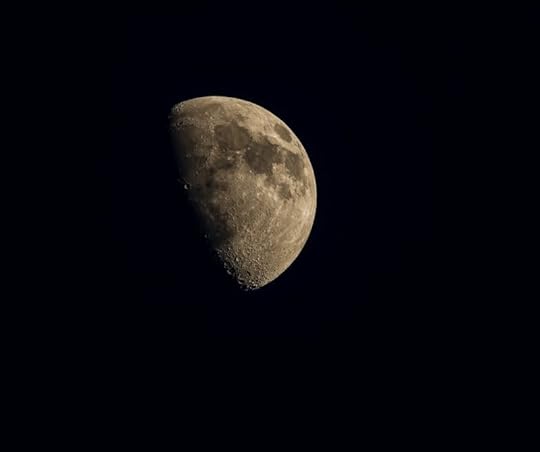
A shadow appeared at the moon’s edge, and Romakaji thought of Cressida, and the night she and the nature witch had spent watching just such a celestial event. How young she had felt that night, how hopeful. Then she looked at Lionel and felt just such a hope surge in her heart. Hope for his happiness, hope for a long life with him, hope for hope’s sake, hope for a miracle.
Lionel thought of the choices Count Furfur had offered him in his dream: to do nothing and enjoy a single life of love and happiness, but condemn Romakaji to an eternity as keeper of lost souls and wife to an Earl of Hell; to kill Sybil with the dagger the earl had given him and drink her blood, harnessing her power for himself and taking Romakaji as his forever bride; or to kill himself, offering his soul up to be born again, and search for Romakaji in his next life. As the minutes ticked away, and the shadow over the moon spread, he pondered what each of these choices would bring to his life. How they might change him, the woman he loved, and the world.
Sybil did not think at all. She cleared her mind and began to chant. Her voice rose up over the pond, hovering like a honeybee over a cup of juice. A nature witch knew better than to miss an opportunity to embolden her powers. Her lunar song was the sticky, silken web which bound her enchantments.
As Romakaji took another bite of the tart, savoring the earthy richness of it, the soft, spongy texture of the small mushrooms baked in the custard, she looked up at the moon in transition. Sybil’s voice wrapped around her like a sheath of muslin, while Lionel’s heart beat steadily with her own.
She felt a change within herself. No longer was she merely outside of her cottage with her lover and her friend, she was back in the early days of her life, feeling fragile and invincible all at once, as every child does. And, when Romakaji looked up at the moon, she found herself there, as well.
Standing on its surface, gazing out at the infinite, she caught a familiar movement at the edge of her sightline. There, on the horizon of her planet’s only satellite stood Count Furfur.
“Soon,” he said. “In a matter of minutes, in fact.”

Lionel saw the Earl of Hell, too. Only in Lionel’s vision, he was not on the moon. Lionel saw Count Furfur standing on the bridge that arched over the pond. His gold chain and charm, the same as Romakaji’s, dangled from his thin, stringy neck, and glowed brightly, like Venus in the night sky. Stealthily, Lionel removed the Count’s dagger from his pocket. It was so sharp that it sliced through the flesh at the tip of his finger, and he didn’t even feel it. He looked at Sybil, whose eyes were closed, and her mouth open in song. She seemed oblivious to them, lost in her witch’s rapture. How easily he could slit her throat, leaving her to slip painlessly into infinity.
Then, his eyes grazed over his lover. Her nimble body, with skin as soft as wind, as lace, as honey. Her gaze was fixed on the moon, which was now three quarters in eclipse, and her face was a mask of concentration. Beautiful, loving, perfect.
His love for Romakaji cast a cold eye over the choices he’d been offered by Count Furfur. He knew he could not allow his lover to become a wife to such a creature. To spend time without end at his behest, caring for the wretched whom he had tempted into everlasting torment. Nor could he kill Sybil and drink her blood, absorbing her powers and awarding himself a wife as if she were a prize. He was not a murderer, and he knew well that such a bargain would corrode the love he’d found.
Lionel looked up at the moon, now fully red. As red as a sunset, a chili pepper, a bleeding heart. He put that sharpest of daggers to his chest and glanced at Romakaji for one last memory of her. It was just then that she tore her eyes away from the moon and the Earl of Hell she saw there. She looked to Lionel for what she thought might be the last time, too.
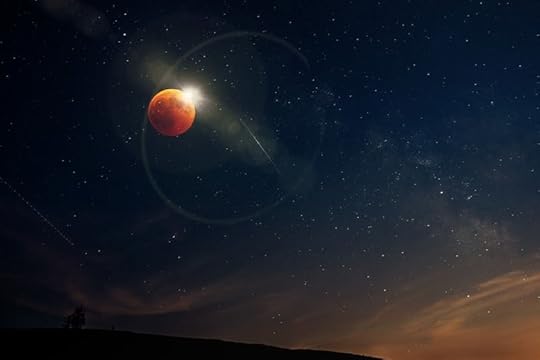
“Romakaji,” he said, and she gasped, seeing the weapon he held in his hand and its placement over his most vital organ.
“Romakaji,” he said again, her name like a prayer on his tongue. “Will you take off the necklace? Not the one I gave you, but the other.”
“It’s too late,” she whispered.
“It doesn’t matter. It’s a hateful thing.”
Romakaji’s hand grasped at the chains around her neck. In her fear of Lionel doing harm to himself, she was careless and her fingers tightened around both chains – Count Furfur’s and the one her love had given her. She yanked hard, and each clasp broke instantly. Her fingers let go of the chains and their charms, flinging them away from her.
“No,” she cried out, once she saw what she’d done. She watched both Lionel’s beautiful gift of love and Count Furfur’s hateful gift of deception drop into the pond she’d been cursed to for so long. Two hundred ninety-six years, twenty-one days, six hours and roughly twenty minutes to be more exact.
She turned back to her love of all loves, though in that moment found she could not recall his name. And Romakaji remembered everything. Clearly, distinclty, as if it had happened only moments before. That had been part of her curse.
“I’ll see you in a few years, I hope,” her nameless lover whispered. Holding the dagger up high, he thrust it deep into his chest.
“Sybil, help him!” She cried.
But the nature witch continued to chant, lost in her communion with the lunar eclipse.
Romakaji thought nothing of curses or consequences. Of bargains or trickery. She grasped the handle of the dagger and pulled it out of her lover’s heart in a single, violent motion. In another motion, equally as determined, she thrust the dagger into her own, long-beating heart. A heart that had survived water, loneliness, and a full one hundred-eight thousand sixty-one days longer than it should have. The many days and nights of Romakaji’s unusual life began to fade, seeming far away to her now, as if she were viewing them through an old telescope.
Sybil’s voice, loud and deep, as if coming up from a canyon, filled her ears. It seemed to pour into her, filling her veins as quickly as her blood left them. The pond, the bridge, the moon, the cottage, all whirred around Romakaji. Only Count Furfur and Sybil remained anchored, standing stock-still – one on the moon, and the other on the blanket, poised over her.
Sybil bent over and extracted the dagger from Romakaji’s body. In an instant, Romakaji’s eyes began to flutter. She licked her lips, took a deep breath.
Lionel’s eyes fluttered, too, and he swallowed hard. He looked at his blood-soaked chest and raised an eyebrow.
Romakaji cast her gaze at the red moon, but the count was no longer there. He appeared on the bridge, and smiled at her – that strange, child-like smile of his.
“Come,” he said.
He held out his absurdly dainty hand, waiting for her to take it. Romakaji felt drawn to do so, even if she did not want to.
“What do I do?”
Sybil opened her eyes and stopped her chanting. “Only you can make that decision,” she told her.
Romakaji stood up a bit unsteadily. She went to take a step towards the Earl of Hell, lifting up her foot and preparing to set it down onto the first step leading up to the bridge. His thin lips parted in anticipation, and she could see his tiny, pearly teeth.
“I’m not going,” she said.
The count narrowed his little eyes.
“But you must,” he commanded.
“I’m staying here.”
“You made a bargain.”
“I remember no bargain,” she told him. “And I think you’re a liar. So, I won’t go.”
Count Furfur’s lips curled. His childlike face became a mask of hatred. “You come right now, or I will tear your friend and your lover to pieces, and you will spend eternity reliving that memory, hearing their screams.”
Romakaji fisted her hands. “I think if you could kill them they’d already be dead.”
“Don’t trifle with me!” He bellowed.
“The only power you have is the power I give you,” she shouted. Romakaji remembered her mother had once told her this was true of all nightmares.
The count’s face changed once again. His mask of hatred fell and his skin became smooth like an egg shell. His lips a thin, red line. Romakaji watched him remove the necklace, the one just like hers, from his neck and drop it into the water.
“Mortal,” he said. “Without me you’ll be weak, with only one life to live. It’ll be over in the blink of an eye. You’ll become old and decrepit, and I’ll watch you die from my throne.”
Then he disappeared.
Romakaji’s heart filled with joy and relief, but she couldn’t remember why. She looked about her – at the blood red moon, the lovely, old cottage with a sweet little pond in back, and at her friend, Sybil.
“Hello.” A dark and handsome young man put out his hand. It was strong, with soft skin and a map of deep lines on his palm. She reached out and shook it.
“This is Lionel,” Sybil said. “He lives in the cottage.”
“Oh.” Romakaji peered at the cottage and imagined how nice it would be to live there. The old stones it was made of, the yellow lights glowing from its windows. Sybil’s place was nice, too, but this cottage seemed more like home somehow. It was almost like she’d lived in it before.
“Lionel’s new to the village.” Sybil said. “He’s only been here for a few months, and is doing genealogy research on the area. Wasn’t it kind of him to invite us to drink some wine and watch the eclipse at his place?”
“Yes, of course,” Romakaji said. Now she was beginning to remember – maybe.
“Sybil tells me you and she grew up here, and you both live in the village together. In one of those old, white-washed stone houses passed down from generation to generation.”
Flashes of memory came to Romakaji like pictures in a book. Playing around this very pond as a girl, watching an eclipse much like this one with a woman named Cressida – Sybil’s cousin, perhaps, mourning the death of her parents – was it only last year? It seemed like much longer than that. She looked to Sybil, who assured her with a firm nod.
“Yes, I suppose we did. We do.”
“You’re lucky,” he said. “I love this area and could imagine staying.”
Lionel glanced down at his shirt. There was a faint, brown stain on it, right over his heart, and he wondered, briefly, what he’d spilled on himself. “Won’t you come in?” He asked them. “I think I have some cheese and fresh bread.”
Romakaji smiled and took his arm, as Sybil stepped back, letting them pass.
“Won’t you be joining us?” Lionel asked her. His eyes remained fixed on Romakaji’s.
“Not tonight,” Sybil said. “I’m awfully tired.”
“Another time, then.”
“Yes,” she said. “The first of many, I’m sure.”
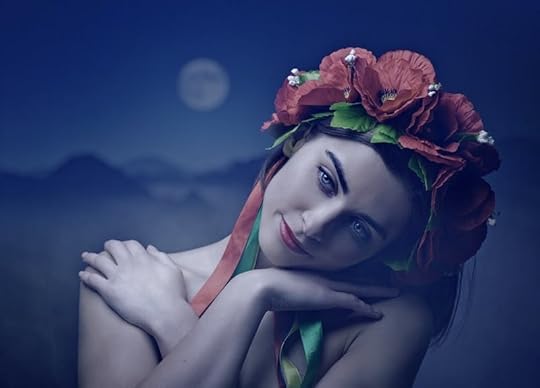
May 28, 2021
To Hell and Back: The Role of the Quest in Fairytales
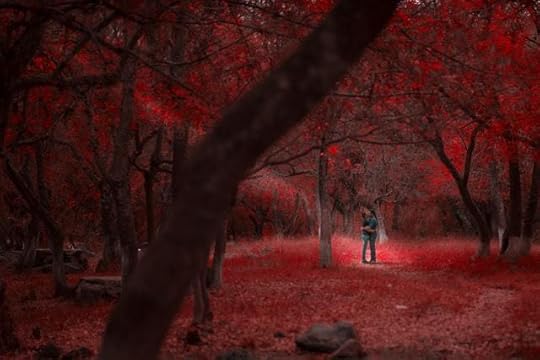 Photo by Cristian Newman on Unsplash
Photo by Cristian Newman on UnsplashIn most fairtytales worth their salt, the ones that really capture our imaginations in a lasting, generations-long manner, a lover – often a prince or princess – must go on a quest. He or she has to perform a series of trials in order to prove worthy, not only of true love, but of a kingdom they are poised to inherit – whether that be a literal kingdom, an actual realm in a fictious country, or a place in God’s kingdom. The Brother’s Grimm tended to focus on the the former, while Hans Christian Andersen had a far more spiritual approach.
Both interpretations are dramatic, exciting, and virtually irresistible.
Let’s take “Sleeping Beauty,” which actually combines the earthly and the spiritual. At nearly a thousand years old, the tale had already gone through several incarnations before the Brother’s Grimm took it on, and ultimately, Disney, made it a world-wide phenomenon.
The earliest versions of the story are like an unhinged hodge-podge of Tarantino’s “Kill Bill,” the ultimate 80s crazy ex-girlfriend movie, “Fatal Attraction,” and “Silence of the Lambs.” It involves everything from our enchanted, sleeping princess getting impregnated by her prince while she’s asleep (and yes, they still live happily ever after), a cruel mother-in-law intent on murdering the sleepyheaded lass, so that she can keep her son for herself, and a harrowing subplot to the original, “enchanted sleep” portion of the tale.
This part takes place after Sleeping Beauty has been awakened by and married to the prince. In it, a woman from the prince’s past insinuates herself into palace life and tries to murder the prince and princess’s children by having a cook kill and serve them for dinner. Much like the huntsman in Snow White, the cook balks at performing such a horrible deed, and tricks the woman by hiding the children, offering up wild game instead. Because killing the progeny of her ex and his new wife wasn’t enough to satisfy her bloodlust, the nasty old girlfriend then orders the cook to murder and serve up the princess. But the prince finally discovers her duplicity, and kills her in the same manner in which she’d planned to slay his wife. The whole palace then feasts on the evil woman.
In all incarnations of the story, the prince is subjected to a series of ordeals he must navigate in order to save the princess and himself. In all incarnations, there is a prophecy of doom and enchantment as told by a fairy. One that warns of the young princess’s “death” by a prick of her finger. It’s a fate that her family desperately tries to avoid, but their efforts are in vain. In the end it is up to the prince who falls in love with the sleeping beauty to rescue her from the curse.
In only the original, medieval account of the story is the young woman’s actual soul at stake if she is not awakened from her slumber. Although that danger isn’t explicit in the 19th and 20th century adaptations of “Sleeping Beauty,” I do think it lingers…implied, but unspoken. After all, the princess is cursed to sleep forever. She’ll neither age, nor die, nor really live unless she is awakened by love. And her soul, by inference, will remain trapped with her.
“Romakaji” Part 8
By Yours Truly
Cressida led Lionel through the cool darkeness of the forest, until they came upon an enormous, dying tree hollowed out at its base. Tiny, red lights reminiscent of summer’s fireflies dotted the yawning, black center of the opening. As Lionel and Cressida entered the tree, it became obvious that the bitty lights were not from an insect. Nor were they a play of light. They were the eyes of a thousand demons keeping watch over those who entered and exited this portal to hell.
Lionel’s hands did not shake, nor his flesh pimple at the sight. Though he was unsettled by what he was seeing, he was also curious, and continued to follow the woman who had commandeered his dream.
Once fully inside the tree, he found himself in a passageway lighted by an eerie glow that reminded him of ghostly bones tinged with a cold, blue undertone. A lowlit incandescence that that seemed to shout of loneliness and anguish. He flesh did pimple then.
“Do not look at them,” Cressida whispered. “They are the captured souls of fools who made bargains with demons.”
Lionel did look, at once fascinated and repulsed by the way the souls twisted and curled like smoke. Watching them was grotesque, almost painful – like he imagined it would be to observe a conscious, unanesthetized man having his leg amputated.
The passageway proceeded to a large chamber, and as they came close to its entrance, Cressida stopped.
“I can’t go any further,” she said. “You can, but there is no guarantee you’ll ever come out.”
“If that’s the case, why would you have me go?” Lionel asked.
But Cressida didn’t answer. She only faded until there was nothing left of her but a bare outline. Then she disappeared altogether.
Lionel looked inside the chamber and saw a strange boy sitting on a throne of red gems – ones that looked sticky and juicy like berries. Next to that throne was a smaller one made of blue and green gems – the green ones murky like the pond next to his cottage. The one he’d rescued Romakaji from. Although the woman he loved was nowhere to be seen, his heart began to drum in fear that she could’ve been taken from their bed, like he had been.
“Come in,” the boy on the throne hissed, his voice very much that of a man.
Lionel stepped over the threshold of the chamber and walked to the red throne. The boy-man was even stranger up close, with taut, dark skin and an obscene daintiness to his physique. Lionel glanced over at the empty throne of watery hued gems.
“What a thrill it is to have a dreamwalker come visit me. You must have very powerful friends.”
“Not at all,” Lionel said. “I don’t even know the woman who took me here.”
“Then you don’t know why you came?”
Lionel did not answer.
“Let me tell you,” the boy-man rasped. “In two days time, there will be a lunar eclipse, at which time you will be presented with a series of choices.”
Lionel crossed his arms and narrowed his eyes, watching the boy-man very intently.
“The first choice is to do nothing but what you planned – to watch the eclipse with your lover, Romakaji of the pond. But if that is what you choose, your Romakaji will be forced to come live here with me, as my wife, and become Countess Furfur: the keeper of lost souls.”
Lionel thought briefly of the souls he had seen in the passage to this chamber and his blood ran colder. He shook the memory away.
“And my other choices?”
“Those are a bit more complicated…or not…depending on how you look at things.”
Count Furfur licked his lips, seeming to thrill to this conversation. “Your second choice is to kill Romakaji’s friend, the nature witch Sybil Ravencroft, by draining her blood and drinking it. This will give you the power to keep your Romakaji from me, and will also make her your wife for all of eternity.”
He then reached into his cloak and retrieved a small, gold-handled dagger as sharp as a razor’s edge and as pointed as a talon. “You must use this for your task, otherwise the transference of power will be incomplete, and you’ll be left with dark magic, but without a bride.”
“And my last choice?”
The Count almost giggled. “To take the same dagger and kill yourself. Thrust it into your heart. It’s very sharp, as you can see, and won’t take much effort.” Count Furfur demonstrated by holding the dagger in the place where his own heart would be, if he had one.
“Why would I kill myself?” Lionel asked.
“Because it will free your Romakaji from the bonds of her curse and her obligation to me, and it will allow you to die and be reborn. Once you are old enough, you can search for Romakaji, and the two of you can be reunited.” The Count’s eyes nearly rolled all the way back in his head. “I just love happy endings,” he whispered.
“I see,” Lionel said.
Count Furfur leaned forward on his throne and offered the dagger to Lionel. As he did so Lionel noticed a gold chain around his neck and followed it down to a charm that dangled over the Count’s breastplate. It was the same charm Romakaji wore.
“Thank you,” Lionel said, taking the dagger. “You’ve given me a great deal to think about.”
 Photo by Ruan Carlos on Unsplash
Photo by Ruan Carlos on Unsplash“Are you alright?” Romakaji asked him.
Lionel inhaled deeply and sat up in bed. His wavy, dark hair was all this way and that, like he’d had a rough night’s sleep. His neck and his brow were wet from perspiration.
“Just a strange dream,” he said. Lionel took Romakaji’s face in his hands and kissed her, stroking the high bone of her cheek.
“My dreams have been peculiar, too,” Romakaji told him.
“My mother used to say that the fuller the belly, the better the dreams.”
Romakaji smiled and smoothed Lionel’s hair. “In that case, I’ll go fix us a big breakfast. Sybil brought us some fresh eggs and more of those unseasonal mushrooms she keeps finding.”
Romakaji brushed his nose with her’s and got up from bed, wrapping herself in his soft, warm robe.
Lionel swung his legs around and put his feet to the floor. He watched Romakaji walk from their room towards the stairs, her grace filling his heart. When he was sure she was in the kitchen, and could hear her lighting the stove top and rummaging for the proper copper pan, he reached into the pocket of his pajama bottom.
Slowly, he retrieved the dagger Count Furfur gave him. He laid it flat on his palm, getting a much better look at it in the light of day, and away from the royal, funereal hues of the Count’s chamber. The gold handle was carved with devotional words writ in many different languages. Lionel recognized the words for love and passion in the three languages he spoke fluently. He also recognized the word for troth.
“Lionel!” He heard Romakaji call from downstairs. “Breakfast is nearly ready.”
“Yes,” he called back. “And so am I.”
 Image by albgal from Pixabay
Image by albgal from PixabayPlease have a listen to this week’s Cold podcast. We talk about the writing life in all of its complicated glory. Not only how we writers evolve and develope the daily habits that allow us to finish massive pieces of work, like a novel (or, ahem, a fairytale), but the emotional journey of mining our personal experiences for our creative efforts. How very differently we deploy our imaginations when writing fiction versus non-fiction, and the mine fields we need to navigate as we expose not only our own hearts, but potentially the hearts of those we love. Folks, it is daunting, and it is beautiful.
May 21, 2021
In Fairytales, Friendship is Instrumental in Conquering Evil
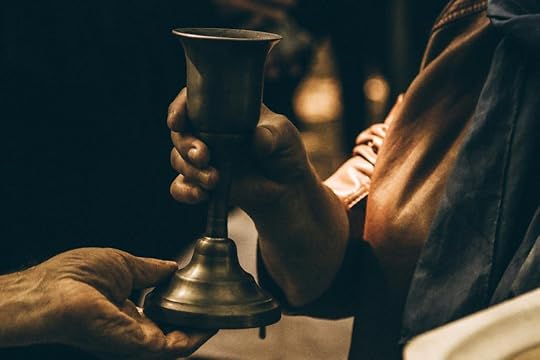 Photo by Jametlene Reskp on Unsplash
Photo by Jametlene Reskp on Unsplash“Friendship multiplies the good of life and divides the evil.” –Baltasar Gracian
In the fairytale genre, friendship is love’s handmaiden. The true friend sees the importance of clearing the path for love to bloom. In most cases, the triumph of the lovers over evil is not only a satisfying romantic end for the two characters in love, but has far-reaching affects for the whole realm. Their love equals order restored and prosperity for the region over which they will govern.
A classic example of this trope is in Snow White – both in the original Brothers Grimm version and Disney’s more sanitized story.
The seven dwarfs become true friends of Snow White. They love and protect the young woman, offering her their home to share after her escape from the Evil Queen. They warn her about not talking to strangers or letting them in the house, although Snow White, ultimately, does not heed their advice. In the end, the dwarfs are instrumental not only in Snow White’s “awakening” after she eats the poisoned apple given to her by the disguised Queen, but in reuniting her with the Prince. The dwarfs become defacto heroes by making it possible not merely for Snow White to survive, but to take her righful place as the true princess of the realm. With the Prince and Snow White married and installed as rulers after the Evil Queen is deposed (and killed), the region once again is free to thrive.
Incidentally, in the Brothers Grimm version of Snow White, the Evil Queen is unmasked as the villain at the Prince and Snow White’s wedding. The Prince is a bit more of an Alpha in the original tale, and tortures the Evil Queen by making her dance in iron slippers that had been heated on the fire. She dies shortly after. Disney glossed over that bit 
“Romakaji” Part 7
By Yours Truly
“You can’t be serious,” Sybil said.
She could not take her eyes off of Count Furfur’s necklace, although the one Lionel gave Romakaji was far prettier in the water girl’s estimation.
“I am serious.”
Sybil shook her head and took a deep sip of the exquisite red wine that Romakaji’s lover had provided for them. “Romakaji, for such an old creature, you seem to lack any wisdom at all. Count Furfur will take you to hell forever if you do not take that necklace off before you or Lionel dies! If you thought you hated the pond, don’t you see how much worse is such a bargain? Do you not understand the concept of forever?”
Sybil could not stop shaking her head.
“My friend,” Romakaji said. “My first true friend in so long. You’re right to worry for me, and even be sad for me. But I am right in my valuation of forever. You judge forever by time, whereas I judge it by the bonds we make, and as I will love Lionel forever, I’m willing to give him forever.”
Sybil did not think she was right. In fact, Sybil thought the water girl had lost her mind. “Have you shared any of this with Lionel?”
Romakaji took the green stone of the necklace Lionel had given her, and held it in her hand, until it became as warm as her palm. “If I tell Lionel, we’ll never again be happy. He’ll either insist I take off the necklace, or the specter of my future will haunt our every waking moment as we try to enjoy the time we have left.”
This time Sybil did not merely take a drink of her wine, but finished the glass, then poured herself another.
“Romakaji, I understand that you wish to have a few happy years, but at some point Lionel will wonder why your aren’t aging. You’re going to have to tell him something.”
Romakaji knew there might come a time when she would have to tell him, and she dreaded that day. She didn’t want Lionel to feel responsible for her decision. The thought of him being happy made her happier than the thought of Count Furfur made her sad. But she also knew the nature of curses. Unless they were broken, they tended to tighten around the accursed’s neck. Just as she became more beautiful as the seconds ticked away, so did her choice regarding her future become more powerful. In time – she didn’t know how long – it would become harder and harder to take the Count’s necklace off of her own volition. She would be called to hell not when she was ready, when she and Lionel had had their fill of love (as if that was even possible), but when Count Furfur was ready. When he had drunk enough of the love he had made possible. One he could watch, but never experience for himself.
“Promise me,” Romakaji said. “That you won’t ever tell Lionel of my choice.”
“Romakaji, I don’t wish to promise any such thing.”
“Nevertheless, I want you to. As my truest and best friend, I ask that you honor my wishes. As a witch, I know you can’t lie when it comes to an oath between friends. Especially if those friends have shared magic.”
Sybil folded her hands and looked deeply into Romakaji’s eyes. “He will not hear it from my lips. I promise you.”
Sybil and Romakaji finished their wine, and made plans to see one another again by the weekend. Sybil was glad that her new friend would be living a fulfilled life while she was here in the physical realm – especially after having spent centuries in a small, cold body of water. But she could not be happy about Romakaji’s decision. Like any true friend, she wanted what was best for Romakaji, and knew that spending eternity at Count Furfur’s side was quite possibly the most terrible thing that could ever happen to her.
“I’m learning how to cook!” Romakaji said, cheerfully. As if she hadn’t condemned herself to be the wife of an Earl of Hell. “I should get started before Lionel comes home – I want to surprise him. Perhaps next time you come, you’ll join us for supper.”
Sybil smiled, and told her that would be lovely.
As she walked out of the cottage, she took a long, sorrowful breath. It was a beautiful day, one of the first that smelled of spring. Down the road, Sybil could see Lionel walking towards the cottage, a lightness to his step. The kind of buoyancy that comes from being in love, and looking forward to the moment he would lay eyes on Romakaji again – even if they’d only been apart for a few hours.
Sybil desperately wanted to tell him about what Romakaji had decided, what she was sacrificing for him. The moment she even had such a thought, her throat felt as if it was closing up on her. She couldn’t form a sound, let alone a word. Such was the bond of magic between two friends; the iron clasp of the word once a promise had been made.
She closed her eyes and tried to rid her thoughts of Romakaji and Lionel and Count Furfur. She uttered a prayer to all that is good in the world. When her eyelids fluttered open again, letting in the light, she noticed a small, yellow mushroom at her feet. It was growing from between the walking stones that led to the road.
Sybil bent down and pulled the mushroom from the earth, examining its smooth, white stem, as thick as a thumb. Black spots covered its cap like freckles. For a nature witch, a mushroom, as long as it wasn’t poisonous, was a fungus that denotes strong ties, particularly friendship. Sybil sniffed it deeply, then popped it into her mouth and ate it, thinking of Romakaji while she chewed.
 Photo by Sandis Helvigs on Unsplash
Photo by Sandis Helvigs on UnsplashLionel walked into a house smelling of onions in butter, the venison he’d brought home from the market the day before, and…something else.
“My friend Sybil found some mushrooms growing in the yard.”
“Mushrooms?” Lionel marveled. “At this time of year?”
Romakaji had been cooking from a recipe book she’d purchased in town, and so far, her every effort had been delicious. She seemed to have a flare for flavors, and thought nothing of adding an ingredient, or taking one away if it didn’t suit her. The only thing she didn’t ever want to make was fish.
They sat down to eat and talked of Lionel’s research, of traveling to the far east together come summertime, and of the lunar eclipse that was coming in a few days. Romakaji loved the moon, as for the greater part of so many years – two hundred ninety-six years, twenty-one days, six hours and roughly twenty minutes – the moon and the fish in the pond had been her only company. She didn’t tell Lionel that part.
“The moon will turn red and be totally eclipsed for about fourteen minutes,” he told her. “We’ll have to stay up and watch it.”
Lionel remembered the last lunar eclipse he’d seen. It had been a couple of years earlier, and he’d made a wish on the moon that night. He wished that before the next total lunar eclipse came, he would find a love. Someone with whom he could spend his life.
He told Romakaji all about his wish, how it had come true, and she kissed him more than sweetly, more than passionately. She kissed him as if he meant everything to her – the sun, the moon, the stars. He was all of those things.
And as she kissed him, Romakaji remembered every detail of the last lunar eclipse she’d seen before she’d been cursed to the pond. Cressida had snuck her out of her house in just her shift. It was an unseasonably warm night. She’d brought nuts and an apple for them to eat, and they’d watched the entire event from the bridge over the pond that would become her home, her prison. They’d watched in awe as the moon turned as red as a sunset, and Cressida chanted a strange song that was one part whistle and one part wail.
“What was that?” Romakaji had asked her.
“An offering,” she’d said. “A nature witch should always sing an offering to the moon on the night of a total eclipse. It strengthens her powers and keeps them pure.”
Romakaji wished she had the power of a nature witch. If she did, she would do something good for Lionel. But as things stood, all she could do was give him her love. And as he laid down to sleep, his belly full of her venison and mushroom stew, she stroked his hair and looked at him with as much love as she could bear. She watched his eyes grow tired, and listened as his breath became slow and steady. His body heavy and still. As still as she had ever seen him as he slept.
Only he wasn’t sleeping. Not exactly. He was deep in a dream that was more like another world. So vivid that its wind cut through his flannel pajamas. The old burs on the ground dug into the soles of his feet, making him wince. It was an older world, where a young woman with stawberry locks of hair beckoned him. She told him that her name was Cressida, and put her fingers to her lips so that he’d know to be quiet. She took his hand and lead him deep into the forest.
“Where are we going?” He whispered.
“To Hell.”
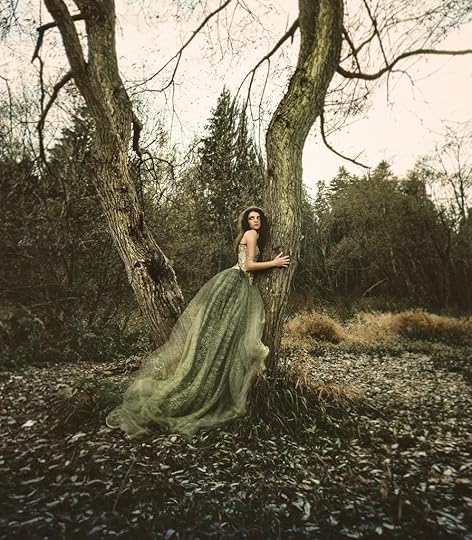 Photo by Alice Alinari on Unsplash
Photo by Alice Alinari on UnsplashTune in next week for the maybe, probably last episode of “Romakaji.”
And while you’re waiting, please listen to the latest COLD podcast. It’ll be the best quarter hour of your day.
May 6, 2021
And They Lived Happily Ever After…Maybe
All fairytales are love stories.
Even at the core of tales like Hansel and Gretel is the love and devotion between a brother and sister. Hans Christian Andersen’s, The Little Matchgirl, is about a poor, dying child and the love she holds for her late grandmother, the only person who had ever treated her with kindness. When the girl dies, freezing to death on the street, it is her grandmother who takes her soul up to heaven.
And, of course, there are the many fairytales that tell of the love that grows between a man and a woman. It is that sort we’re unearthing in our next installment of “Romakaji,” our Cold fairytale-in-progress. I decided to make it a romantic love because that’s a theme here in the Cold…but that doesn’t mean they’ll live happily ever after. They might – I haven’t decided yet. But this is the Cold, after all, and we don’t just deal in hopes and wishes here. We also address the greater truths and meanings of not always getting what we want – or what we think we want. We celebrate getting what we need. What, in the end, was perhaps what we would have hoped and wished for all along, had we known better.
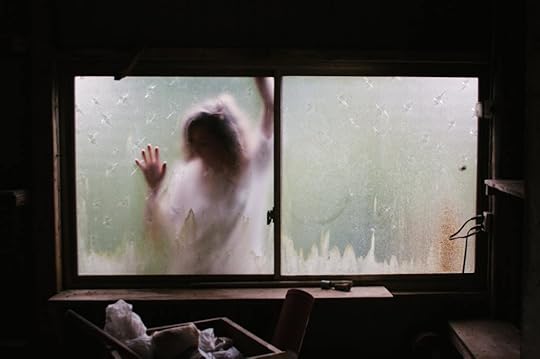 Photo by Priscilla Du Preez on Unsplash
Photo by Priscilla Du Preez on Unsplash“Romakaji” Part 6
By Yours Truly
Romakaji took a long time to walk home from Sybil’s stone house. She wandered through the forest, savoring the crush of cold leaves beneath her feet. She tip-toed through the yards of old and new cottages with windows that glowed yellow with electric light and chimneys that billowed grey smoke. As a child, she had hated the winter, but now, as a woman who had spent centuries afloat, unable to put her heels to the ground, she relished the bite of the frigid air on a brisk walk, and then cozying into the comfort of an armchair next to a fire. Or feeling the warmth of a lovers arms as he held her in sleep.
Even with Byron, the boy she’d loved better than all of the other boys she’d known when she lived in the pond, love had been a cool, if not cold experience. His skin had been chilled and wet when he held her in the water and would grow goosepimpled and prune over time. Sometimes, his lips would turn blue. His touch had been better than nothing, but even his most loving and passionate embrace couldn’t compare with even a brush of Lionel’s finger.
Lionel’s fingers.
Dry and smelling of herbs and the walnuts he likes to crack, of paper and pen, and sandalwood soap. The loving tentacles that reach for her as if they harbor all of his senses. They lead to the rest of him: his lean, muscular arms and sturdy shoulders that could carry two of her if they tried, the soft, curly hair that sprouts at the top of his chest, the coarse hair that he shaves every morning, making his chin smooth and square.
Then there are Lionel’s eyes.
So different from Byrons, which were crisp and blue. Lovely, yet thin somehow, like panes of glass in a window. Lionel’s are of soil and chocolate, tanned leather and glossed wood. They speak to her not only of love and desire, but of all the things he wants to know, and yearns to share with her. They are a deep well of forever.
And they lit up with a joy he took no pains to conceal when she walked through the door of their house.
“Where have you been?” He asked her.
She told him she’d gone to have tea with her new friend, Sybil, and he seemed happy to see her finally settling in and finding things to do other than piddling around the cottage or reading. He liked to see her becoming more confident.
“Tell me,” she said, as they sat on the soft, spongy sofa he’d first layed her upon when he carried her from the pond. She leaned on him and rested her chin on his chest, looking up into his handsome face. “What would you do if I died?”
Lionel blinked hard. “Why would you ask such a thing?”
“It’s just that I think about how much I love you all the time. I see how your eyes seek me out, how your skin thrills to my touch. Do you not ever think about what it would be like if we lost one another?”
Lionel caressed her hair and kissed her temple. “I know it hasn’t been very long for us, but I’m only ever happy when I’m in your presence. I think if something happened to you, I would never feel this again. I would live my life alone, and have only my work and interests taking me from moment to moment.”
Romakaji could see this was true. That he didn’t only love her because she was becoming more beautiful by the hour, although beauty could be a powerful thing. It was Lionel’s beauty that made her vulnerable to him when she peeked her head up from the pond and saw him for the first time, after all.
Over the centuries, Romakaji had discovered how easily one could grow accustomed to beauty, though. How this, too, had been part of her curse. To be stared at with such lust and longing from outside of the pond, but ultimately unloved. To be dreamed about like a picture in a magazine, and put away just as readily.
Lionel loved her in ways the other boys, no matter how beguiled by her at the outset, never had. With Lionel, there were long talks about all the things she’d thought about in the two hundred ninety-six years, twenty-one days, six hours and roughly twenty minutes she’d spent in the pond. Why the trees seem to shiver when a person pays them real attention? If the twinkling of stars in the night sky is its own language and what those stars might be trying to tell us? Why ghosts don’t seem to recognize that they are no longer among the living? With Lionel, there were walks around the cottage grounds, both of them alive to the subtle changes of nature that crept silently upon each day. There were nights of love so tender and full of intention that even thinking about them made it difficult to breathe.
Of course, it was also their mutual loneliness that bound them. A deep feeling of singularity that made it hard for them to truly connect with a lover, or even a friend. She and Lionel each had minds that wandered into secret rooms that were largely closed to others – not because they were unwilling to share them, but because few people wished to enter into those domains. For Romakaji, it had always been this way, even before Cressida had cursed her to the pond. For Lionel, it had been this way since he could remember. It was only after they met and entered into each other’s secret rooms, that they felt like they belonged somewhere, with someone, for the first time.
Poor, poor Lionel, Romakaji thought. He had but this one, short life. This fleeting chance at happiness with her that would glow bright like a firework and extinguish just as quickly. In the coming decades, he would become frail and gray, while she would remain just as she was.
Romakaji tapped the necklace at her throat. How easy it would be to take it off and simply float up to heaven, as if she’d never met Cressida, or her horrible suitor, or the dreaded Count Furfur, or her beautiful Lionel.
“It’s a shame you can’t remember who gave it to you.”
“Hmm?”
“Your necklace.”
Romakaji smiled and took her hand from the charm. She kissed the spot over Lionel’s heart. “It doesn’t matter.”
Only it did matter to Lionel. For when Count Furfur had made it possible for him to love Romakaji, had opened his heart to her, the Earl of Hell had also planted a seed of jealousy in Lionel’s affections. It was nothing personal. All great loves have an element of possession that must be struggled with, pondered, and ultimately, tamed. It is an ingredient of romantic love that’s much like salt in a sweet cake. With none, the cake is bland, but too much makes it unpalatable.
“Romakaji,” Lionel said. “I was going to wait until the first spring buds appeared, but I think I don’t have the patience.”
“For what?”
Lionel got up from the sofa and went to his desk by the window. He opened his pen drawer and took out a small, rectangular box trimmed with gold foil. He brought it to Romakaji and sat down next to her.
“This is for you.”
Romakaji’s breath caught in her throat. It had been so long since someone who loved her had given her a present.
“Thank you,” she said, taking the box in hand.
“Aren’t you going to open it?”
“Oh.” Romakaji hadn’t realized there was actually something in the box. It was a pretty enough present all on its own.
“Let me,” Lionel said.
He took the box from her hand and opened it like a clam shell. Inside was a lovely gold necklace with an oval charm dangling from the chain. At the center of the charm was a pale green stone with great depth of color. It seemed to sparkle from the inside.
“I’ve never seen anything so fine,” she said.
“It reminded me of your eyes. You like it?”
“I love it, and will cherish it for always.”
Romakaji took the necklace from its pretty box and hung it around her neck. It had a long chain that dangled well beneath the necklace from Count Furfur. Lionel’s present fell just over her heart, which she thought was fitting.
“Would you like me to help you take off the other one?” Lionel asked.
Romakaji felt a bit flummoxed. She fingered Count Furfur’s charm for a moment, then rose up and walked over to a mirror that hung by the coat stand.
“My, though,” she said, as she looked at herself. “They do look so lovely together. Did you buy this with that in mind?”
“Not exactly,” Lionel said.
Romakaji bit down on her lip and wrapped her arms around her middle.
“Well, I think for now I’d like to try wearing them together. One is a symbol of my old life, and this one – this perfect one you’ve given me – a token of love for the rest of our lives together.”
“As you wish,” Lionel said.
He went to the mirror and stood behind her, admiring her light, silvery hair and plum, perfect skin. How his darkness so complimented the fairest of her features. It was the way their emotions complimented one another’s, and their interests in nature and the stars. What they shared seemed to deepen with every day they spent together.
Lionel turned her to face him. He put his hands on her cheeks, holding her head as if it was the most precious thing in all the world. “You asked me what I would do if you were no longer with me.”
Romakaji nodded. When Lionel was this close, she seemed to lose all ability to speak.
“I would die,” he said.
He then kissed her with both sweetness and passion. He kissed her for a long time. Until every part of her was filled with love, and her legs felt as soft as caramel. When he broke from her, finally, he opened his eyes and looked into hers. It was as if he’d stepped into her soul and make his home there.
“I will never leave you,” she whispered.
And she realized, in that moment, that she meant it. Romakaji would not, could not, watch him mourn her from heaven. She would not, could not, allow him to live his one, short life without love. The way she loved him wouldn’t allow that.
If it was the fate of her curse, and the will of her creator; if it was folly what she was doing, so be it. If she must give herself to Count Furfur for eternity in order for Lionel to have happiness, for her to share in it even for a few, measely years, then that is what would be.
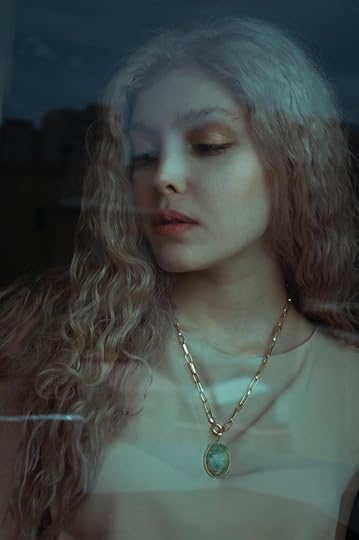 Photo by Baran Lotfollahi on Unsplash
Photo by Baran Lotfollahi on UnsplashOk, Cold readers – here’s your chance to vote for the ending you think “Romakaji” needs. Should she and Lionel live happily ever after or not?
Leave your answer in the comments here, or, if you are reading this via my newsletter, just email me back with the words “Happily Ever After” or “NOT.”
And don’t forget to listen to this week’s Cold podcast!



